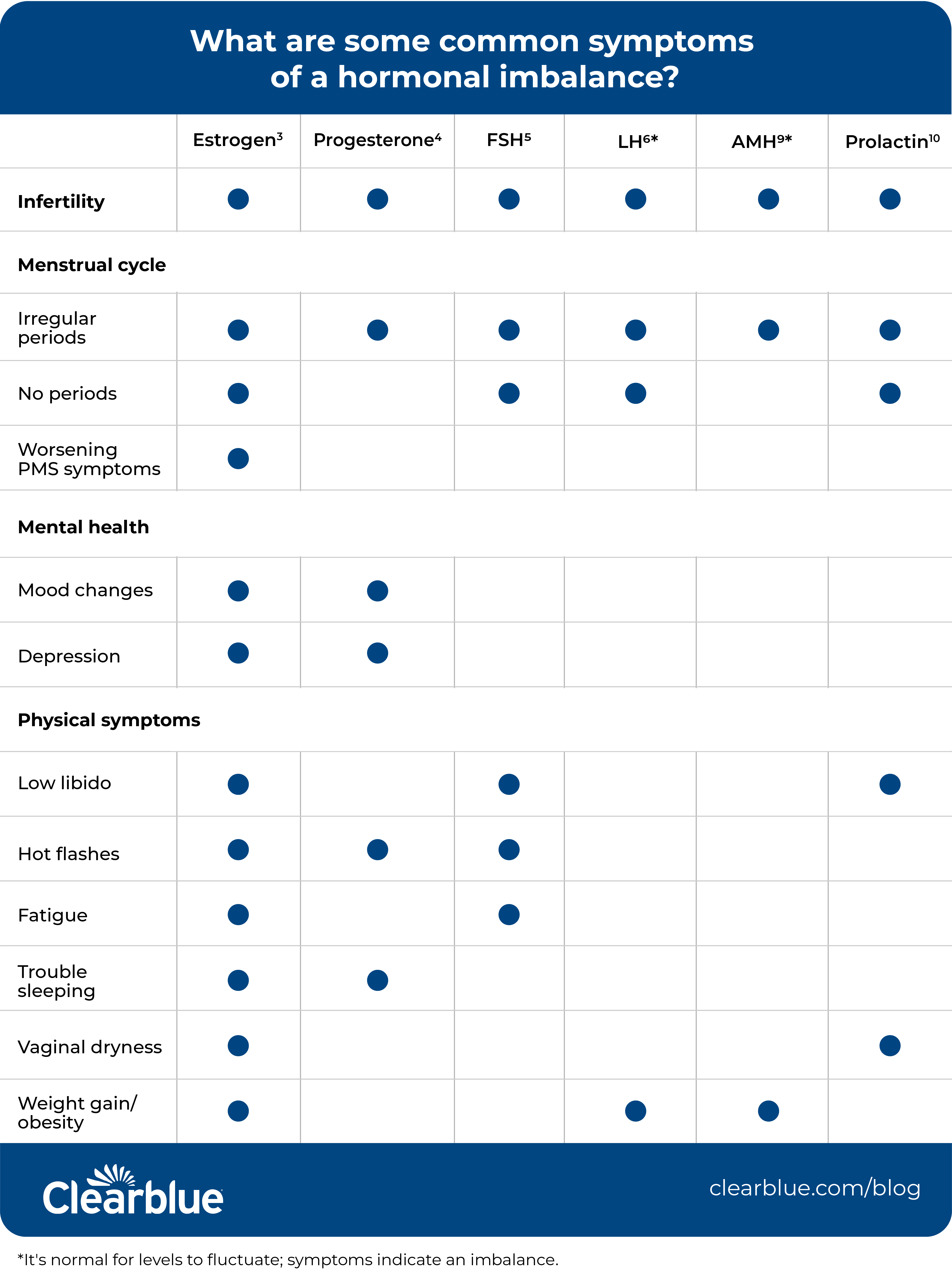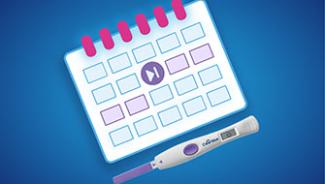The connection between hormone imbalance and infertility

Talking to your doctor is especially important when considering your fertility options. This article should not be considered medical or legal advice.
If you’re struggling to get pregnant, a hormone imbalance could be to blame; hormone imbalances are the No. 1 cause of infertility in women.1 But how do you know if you have a hormone imbalance? If you think you do, when should you see a doctor? And if it turns out you have a hormone imbalance, is there any hope of getting pregnant?
The good news is yes, there is hope. Although research is ongoing, we know a lot more about hormones than in generations past. Here’s where the knowledge stands today.
First, what is a hormonal imbalance?
According to Cleveland Clinic, “a hormonal imbalance happens when you have too much or too little of one or more hormones.”1 Hormones, often referred to as your body’s chemical messengers,2 are really important. Produced in the endocrine glands, ovaries and testes, they affect sexual function, reproduction, growth and development, metabolism and mood.2
Hormones are powerful, and even a small imbalance can affect your cells or your overall health.2 But knowledge is powerful, too. Once your healthcare provider determines which hormones are imbalanced, they can recommend next steps.
How can a hormonal imbalance cause infertility?
Several hormones can strongly impact fertility. A hormonal imbalance can cause infertility in various ways, depending on the hormone or hormones involved. For instance, hormones that cause irregular periods can make it harder to track ovulation and your fertility window.
Below we provide some general information on the more commonly known hormone imbalances that can affect fertility. To get a more in-depth understanding of how hormone imbalances affect fertility, or if you suspect a hormone imbalance is making it difficult to conceive, talk to your healthcare provider.
Estrogen imbalance and infertility
Estrogen helps regulate the menstrual cycle, promotes the development and release of eggs, thins the cervical mucus to help sperm travel through the cervix into the uterus, and thickens the uterine lining to prepare for pregnancy.3
High or low levels of estrogen can disrupt the menstrual cycle.3 Additional estrogen-related conditions that can affect fertility include endometriosis, female sexual dysfunction (FSD), polycystic ovarian syndrome (PCOS), primary ovarian insufficiency (POI, also known as premature menopause), and uterine fibroids and polyps.3
Progesterone imbalance and infertility
Progesterone prepares the lining of the uterus for a possible pregnancy each month.4 If pregnancy doesn’t happen, progesterone levels fall and your uterine lining breaks down, leading to your period. If pregnancy occurs, progesterone supports the pregnancy.4 Low progesterone levels can lead to irregular periods and difficulty conceiving.4
Follicle-stimulating hormone (FSH) imbalance and infertility
FSH helps regulate the menstrual cycle, triggering the follicles in the ovary to grow and prepare eggs for ovulation.5 FSH levels vary throughout the menstrual cycle, but continuously high levels of FSH could signal an issue with the ovaries, possibly POI5 or perimenopause.
Luteinizing hormone (LH) imbalance and infertility
LH regulates the function of ovaries, stimulates ovulation and increases progesterone, which is needed to help support a pregnancy if one occurs.6 Per Cleveland Clinic, “High LH levels can signify that your sex organs aren’t producing enough steroid hormones,” or it could point to PCOS.6 Low levels may signify irregular or missed periods due to excessive exercise.6
Thyroid stimulating hormone (TSH) imbalance and infertility
TSH stimulates your thyroid cells to generate two hormones, thyroxine (T4) and triiodothyronine (T3).7 Rising or falling levels of T4 and T3 cause changes in the menstrual cycle, including heavy, irregular or absent periods.7,8 Additionally, an overactive or underactive thyroid can affect ovulation or prevent it from happening at all.8
Anti-mullerian hormone (AMH) imbalance and infertility
AMH relates to the number of eggs you have. As AMH levels fall naturally as you age, the number of eggs available for fertilization also falls.9 High levels of AMH can be a sign of PCOS.9
Prolactin imbalance and infertility
Prolactin promotes lactation.10 If you’ve recently lost interest in sex, high levels of prolactin could be to blame, as a rise in prolactin levels can cause vaginal dryness.10 High levels of prolactin can also lead to irregular or absent periods.10
What are some common symptoms of a hormonal imbalance?
A hormonal imbalance can cause many symptoms that vary depending on the hormone or hormones involved. If you’re experiencing any of the symptoms listed below, talk to your healthcare provider about whether a hormone imbalance may be the cause.

When should I see my doctor if I suspect a hormonal imbalance?
Because hormonal imbalance symptoms vary so widely and could indicate a range of conditions or issues, it’s important to talk to your healthcare provider anytime you notice a change in your body. If you feel you’re not getting the help you need, don’t be afraid to seek a second opinion! Symptoms for a hormonal imbalance are wide-ranging, so advocating for your health is key.
What does a hormone level test involve?
Your healthcare provider will determine what types of tests are necessary based on your symptoms, health history and more. A blood test is the most common way to determine hormone levels.11 The kind of tests used will depend on your use of hormonal birth control. Imaging can take a closer look at the pituitary gland, uterus, ovaries and thyroid, if needed.11
How can I balance my hormones?
Depending on your test results, your healthcare provider will likely offer ways to help get your hormones back in balance. Some people take nutritional supplements, but there is little scientific evidence pointing to their efficacy.1 However, your healthcare provider may recommend lifestyle changes such as managing stress and exercising regularly.1 They may prescribe medication (including hormonal birth control), suggest hormone replacement therapy or radiation therapy, or recommend surgery depending on your personal circumstances.1
The bottom line? Ask your doctor whether hormones could be causing symptoms if:
- You’re under 35 years old and you’ve been trying to conceive (TTC) for more than a year with no luck.
- You’re over 35 years old and you’ve been TTC for six months.
- You’re over 40 years old and TTC.
- You’ve been trying to get pregnant, but something just feels off.
Hormones are small but mighty, and an imbalance can cause issues with fertility and your general health. Your healthcare provider can pinpoint whether there is an imbalance and recommend solutions that fit your needs.
Related Articles
- Cleveland Clinic. Hormonal imbalance. Updated April 4, 2022. Accessed May 17, 2023. https://my.clevelandclinic.org/health/diseases/22673-hormonal-imbalance
- National Library of Medicine. MedlinePlus. Hormones. Updated October 7, 2016. Accessed May 17, 2023. https://medlineplus.gov/hormones.html
- Cleveland Clinic. Estrogen. Updated February 8, 2022. Accessed May 17, 2023. https://my.clevelandclinic.org/health/body/22353-estrogen
- Cleveland Clinic. Progesterone. Updated December 29, 2022. Accessed May 17, 2023. https://my.clevelandclinic.org/health/body/24562-progesterone
- Cleveland Clinic. Follicle-stimulating hormone. Updated January 23, 2023. Accessed May 17, 2023. https://my.clevelandclinic.org/health/articles/24638-follicle-stimulating-hormone-fsh
- Cleveland Clinic. Luteinizing hormone. Updated January 8, 2022. Accessed May 17, 2023. https://my.clevelandclinic.org/health/body/22255-luteinizing-hormone
- Cleveland Clinic. Thyroid-stimulating hormone (TSH) levels. Updated July 25, 2022. Accessed May 17, 2023. https://my.clevelandclinic.org/health/articles/23524-thyroid-stimulating- hormone-tsh-levels
- Johns Hopkins Medicine. Thyroid disorders in women. Accessed May 17, 2023. https://www.hopkinsmedicine.org/health/conditions-and-diseases/thyroid-disorders-in-women
- WebMD. What to know about anti-mullerian hormone levels. Updated July 7, 2023. Accessed May 17, 2023. https://www.webmd.com/a-to-z-guides/what-to-know-anti-mullerian-hormone- levels
- Cleveland Clinic. Prolactin. Updated February 15, 2022. Accessed May 17, 2023. https://my.clevelandclinic.org/health/articles/22429-prolactin
- Testing. Hormone imbalance and hormone level testing. Updated February 10, 2023. Accessed May 17, 2023. https://www.testing.com/hormone-imbalance-and-hormone-level-testing/

When to start testing for ovulation?
You'd like to use a Clearblue® Ovulation Test and are wondering when you should start testing? Our tool can help you!




